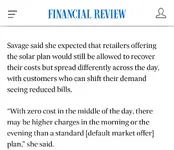Any links to this stuff Mike, just y'know, for referenceThe first solar subsidies offered in NZ were under Shipley but, under pressure from the Greens, Helen Clark’s government removed them in favour of a cheap system, which was the only one with a subsidy offered.
The problem was, they did exactly what this current lot favour and only took advise from those who gave them the outcome they wanted and didn’t talk to those within the industry. Back in those days, photovoltaic solar panels were hugely expensive so grants were given to those installing solar water panels. The problem was, standard HWCs off the time available in NZ were galvanised, not stainless steel, so they weren’t suitable for solar water heating as they would corrode.
The Greens didn’t like that solar water heating wasn’t being adopted in huge numbers in NZ so, as part of their confidence and supply agreement, they wrote a specification for the only hot water solar system that would receive the government grant…. and it was so cheap, it covered only inferior products including a galvanized HWC. The installers hated the cut priced system and only two were installed in NZ.
It’s a pity because companies like Sola60 had some really good products but eventually went out of business. I personally specified their products, including German built stainless steel hot water cylinders designed specifically to be used for solar hot water installations for quite a few projects.
One of the heads from Sola60, moved across the Ditch and headed up one of the largest installers of solar panels/batteries in Queensland until he retired a few years ago. I’m still in contact with him as he’s a fountain of knowledge when it comes to solar systems.
Presuming the technology is much better now.




